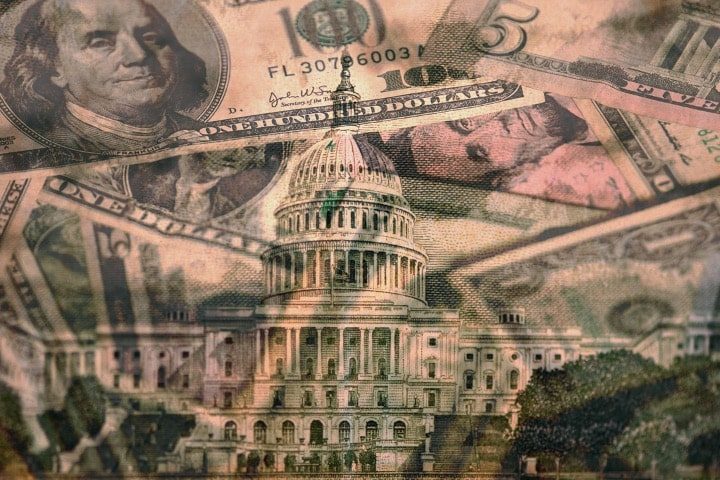
The House Budget Committee approved a bill on Thursday to create a bipartisan fiscal committee that would make policy recommendations to Congress to limit the growth of the “unsustainable” national debt, now at more than $34 trillion.
The committee, led by Representative Jodey Arrington (R-Texas), spent several months reviewing the “Fiscal State of the Nation.” Arrington stated, “At the time of our first hearing, all of us in this room agreed — our unsustainable national debt is the greatest challenge of the 21st century. A sovereign debt crisis would jeopardize not only our economy, but our national security, America’s leadership in the world, and our very way of life.”
Thursday’s hearing with the passage of H.R. 5779, the Fiscal Commission Act of 2023, was the culmination of the committee’s in-depth review process. This bill creates a bipartisan debt commission consisting of 16 members appointed by the speaker of the House, the House minority leader, the Senate majority leader, and the Senate minority leader.
The commission will not only include 12 members of Congress, but four well-respected leaders appointed from the private sector to assist in providing ideas and expertise. The panel would be tasked with identifying policies and proposing recommendations to Congress in an attempt to reduce spending and bring down the government’s debt-to-GDP ratio. Only elected members of the panel will be able to vote on the policy recommendations.
Arrington said in a press release,
Today is a great day for America, for governing this country that we love, and for a constituency that is conspicuously absent from the halls of Congress: our children and grandchildren. No leader worth their salt can look at the balance sheet of the federal government, CBO’s projections, and our unfunded liabilities into the future — $120 trillion over the next 30 years — and not be shaken to their core and stirred in their spirit to do everything they can to make sure that we don’t bankrupt the greatest country in the history of humanity.
This isn’t a Democrat problem or a Republican problem — it’s America’s problem, and it’s a mathematic reality that will require real leadership from both sides of the aisle before it’s too late. I am so proud of the Budget Committee’s hard work, constructive debate, and sense of urgency about making the difficult decisions to make sure we don’t become the first generation of leaders to leave this country worse than we found it.
According to the Associated Press, Senators Joe Manchin (D-W.V.) and Mitt Romney (R-Utah) have sponsored a companion measure in the Senate.
Some Democrats are against the commission, as they believe it could lead to cuts to major spending programs such as Social Security and Medicare.
“This particular legislation we’re considering raises legitimate concerns that a fiscal commission could pave the way for cuts to Social Security and Medicare,” said Reprsentative Dan Kildee (D-Mich.) during the Thursday hearing.
Kildee reportedly said that “fiscal commissions in the past have prioritized cutting spending and haven’t focused on changes to the tax code that would close the gap,” and that the tax code needs to make “the wealthiest individuals and the biggest corporations pay their fair share.”
Representative Brendan Boyle (D-Pa.), according to the Associated Press, “fears that some lawmakers want to use the commission ‘as a backdoor way to force through unpopular cuts.’ He said Congress needs to have the courage to increase the revenues going into Social Security and Medicare, which would put both programs on firm financial footing for decades ahead.”
In addition to the Fiscal Commission Act, the budget committee shared that they also approved two associated measures on Thursday with bipartisan support:
- H.R. 6952, Fiscal State of the Nation Act — Raises the profile of America’s fiscal health by requiring the Comptroller General to present to a Joint Session of Congress on the federal government’s balance sheet, trends driving our debt and deficit, and our long-term unfunded liabilities.
- H.R. 6957, Debt-to-GDP Transparency and Stabilization Act — Requires current and projected debt-to-GDP ratios to be included in both the President’s budget and in any congressional budget resolution. Debt-to-GDP is widely accepted as the most meaningful measure of indebtedness. By taking into account a country’s ability to service and repay its debt, debt-to-GDP ratio encourages debate about pro-growth economic policies that can play a big role in reducing our indebtedness.
The Committee for a Responsible Federal Budget (CRFB), a nonpartisan, non-profit organization committed to educating the public on fiscal policy issues, appreciated the budget committee’s “critical work” on establishing a fiscal commission.
“A bipartisan fiscal commission would give the country’s dire fiscal situation the proper attention it deserves,” said CRFB President Maya MacGuineas in a press release. “In the last two decades, the national debt has tripled as a share of the economy, and modest surpluses at the start of the millennium have been replaced with $2 trillion annual deficits.”
MacGuineas added, “Establishing a commission won’t solve these problems. But it will give policymakers the opportunity to at least discuss them seriously, and hopefully identify policy solutions that Congress can then enact into law. Commissions have worked in the past, and a new commission is probably our best current hope for curing our fiscal woes.”




